Did you choose solar power as a clean energy solution for your home? Amazing! Now, increasing its longevity should be your primary concern. Regardless of age, any solar energy system can begin to show signs of wear and tear over time. This can lead to underperforming panels. You will now have to make the call – repair your solar panels or replace the system completely.
The decision to replace or repair your solar panels is quite important. It impacts your energy production as well as the continued return on your investment. Allow our experts at Solar Medix to help you make the right choice.
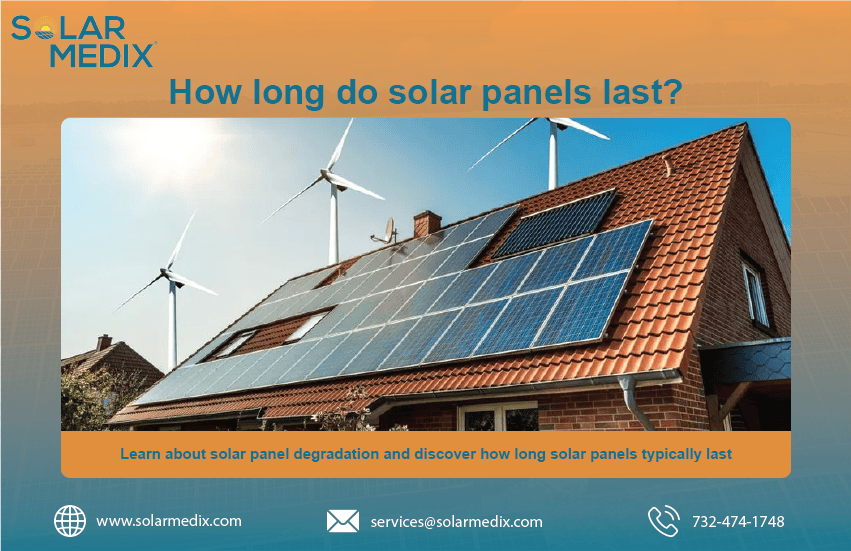
How Long Do Solar Panels Last?
Most solar panel manufacturers offer long-term solar panel performance assurances spanning more than two decades. Knowing this provides you with a sense of assurance about your solar investment. Nonetheless, it is important to verify your warranties’ precise terms. Namely, workmanship protections contrast with those guaranteeing electrical generation percentages.
When there’s an efficiency drop or inverter malfunction, solar experts first check if the system is still under warranty. Some installers offer performance-based compensation contracts. These warranties provide clients with refunds if there are any faults during the multi-year contract. This reduces uncertainty for those committed to solar energy long-term.
When using solar energy, it’s crucial to know the details of solar panel warranties and service agreements. This will help you feel confident in your selection of a reputable solar provider. You can look forward to a future powered by clean electricity without any glitches.
Solar Panel Degradation
Just as with any machinery, solar systems slowly decline with time. A solar panel’s decay is gradual. This means that its generation lessens bit by bit each day compared to the day prior.
Across its lifespan, a photovoltaic module’s electricity output shrinks on average by 0.5% per annum. Most manufacturers still apply a yearly degradation pace of 0.75% as the norm.
Roof-mounted solar systems easily provide up to three to four decades of service. Yet the output of these panels near the end of their lifespan will be lower than when they were brand new.
Factors that Affect Solar Panel Lifespan
While many factors can contribute to the degradation of solar panels, the most common ones are:
- Temperature and Weather: Solar panels face year-round exposure to the elements. Extreme temperatures cause thermal cycling, leading to microcracks. Hail, strong winds, and heavy snow can cause physical damage, while UV radiation degrades panel materials over time.
- Irregular Maintenance: Consistent solar system maintenance is paramount for premium efficiency. When dust and debris amass on the surfaces, they clog the panels and diminish the energy captured from the sun. Neglecting checks allows minor malfunctions to metastasize into serious problems if left unaddressed.
- Partial Shading: Shading on solar panels from clouds, dust, or nearby structures can reduce your panels’ performance. If only parts of the panels are in the sun, they can’t work at full capacity. Dust buildup can create hot spots that may damage individual cells.
- Quality: Panels constructed with quality materials are more resistant to deterioration. Low-quality models may degrade more rapidly when confronted by environmental rigor. When you invest in top-tier technology, you reap its benefits for more years ahead. Your solar system will perform better and stand tall against the tests of time.
- Installation Quality: The installation affects the efficiency and longevity of your solar panels. Poor installation can cause a misaligned, poorly sealed, or improperly mounted compressor. Any of these issues can make the compressor work less efficiently and risk premature damage. The most reliable way to enhance production and panel life is to get installation by a pro like Solar Medix, to ensure the most accurate positioning and best mounting.
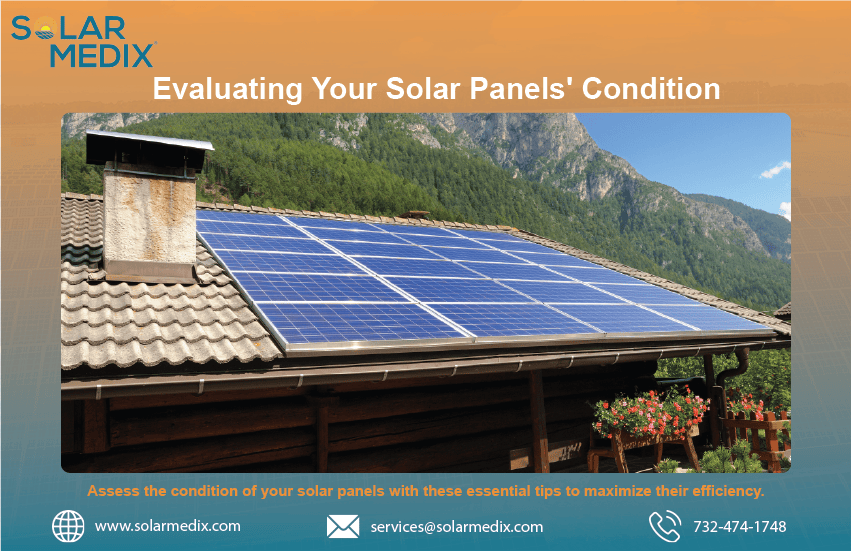
Evaluating Your Solar Panels’ Condition
A thorough evaluation of your solar panel systems is the first step in deciding whether to replace or repair your solar system. Critical factors to consider are:
- Panel age
- Damage severity
- Performance output
Modern solar panels are designed to last for decades and meet industry standards. However, they can still suffer physical damage and occasional malfunctions.
If your inverters and panels are still under warranty, the most economical course of action might be to hire a solar repair service. On the other hand, to ensure that your solar system’s performance doesn’t decline, you may need complete or partial replacement. This is often the case with panels that are getting close to the end of their warranty or those that have sustained substantial damage.
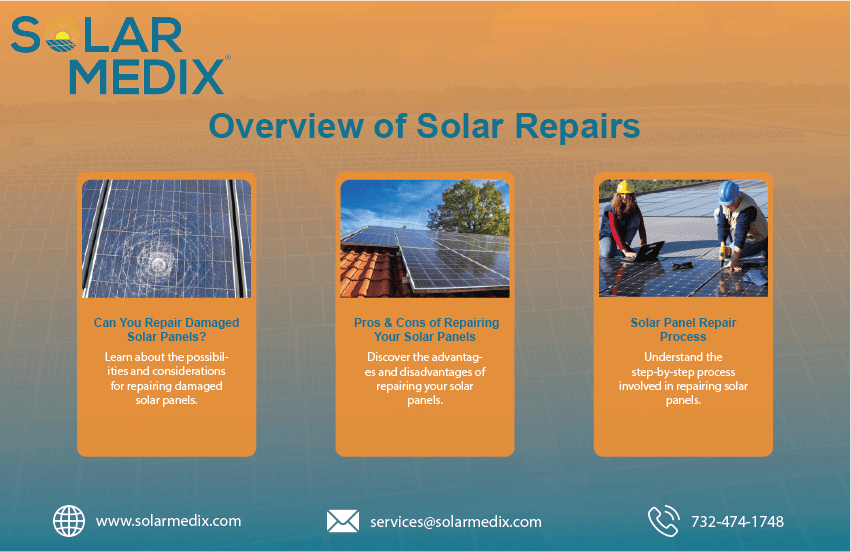
Overview of Solar Repairs
Solar panels often need to be replaced, but not always. Let’s discuss when solar panel repair service might be required.
Can You Repair Damaged Solar Panels?
It’s crucial to understand that shattered or cracked solar panels cannot be repaired. Physical damage to the glass or cells compromises solar panels’ functionality and efficiency.
In such cases, replacing the damaged panel with a new one is the best course of action. However, not all solar panel issues necessitate complete replacement. A solar panel that is not producing the same amount of energy as the others may still be repairable. It may have problems within its components or connections, which can be easily fixed.
Common repairable issues that can be addressed through inspection and repair include:
- Faulty optimizer
- Microinverter
- Wiring
- Junction box
By promptly identifying and resolving minor defects, you can restore the performance of that damaged panel. With proper care, your panel will be back to an optimal level consistent with the rest of the system.
Pros & Cons of Repairing Your Solar Panels
When deciding between repairing or replacing solar panels, it’s important to weigh the pros and cons. Although fixings can offer several advantages, potential downsides also demand reflection.
Pros of Solar Panel Repair
- Cost-Effectiveness: Repairing minor defects is usually less costly than a complete overhaul. By fixing underlying issues like fractures and leaks, you can avoid having to replace the whole system.
- Resourceful Usage: Professional repairs can restore functionality. This helps you save on replacement expenses and material demands.
- Minimal Impact from Minor Imperfections: Minor scratches and flaws rarely influence output. So, getting a solar replacement is quite unnecessary and a mere added cost.
Cons of Solar Panel Repair
- Long-Term Efficiency Concerns: If an issue continues and you notice a decline in efficiency, replacement may prove to be a wiser option.
- Potential for Recurrent Issues: Inept fixes risk extra costs and inconveniences over the years.
As a leading solar maintenance and repair company, Solar Medix employs trained technicians who excel in the solar field. They leverage their skills and cutting-edge technology to provide cost-conscious, durable solutions.
Solar panel homeowners should consult experienced professionals to determine the best maintenance plan. Weighing these pros and cons helps make an informed decision. Whether you choose to repair or replacement of solar panels, understanding these factors ensures you make the most profitable choice.
Solar Panel Repair Process
When only a few cells break, the damage is usually quickly and easily repaired. But if the wiring has melted or frayed, the repair can be more involved and cost more.
Repairing damaged wires as soon as possible can also be less expensive than waiting for repairs. Some solar equipment and the extent of the damage dictate how solar repair is carried out. A thorough inspection of your solar cells, wiring, and panels will help you pinpoint the necessary repairs. Feel free to reach out to our knowledgeable team at Solar Medix today for expert assistance.
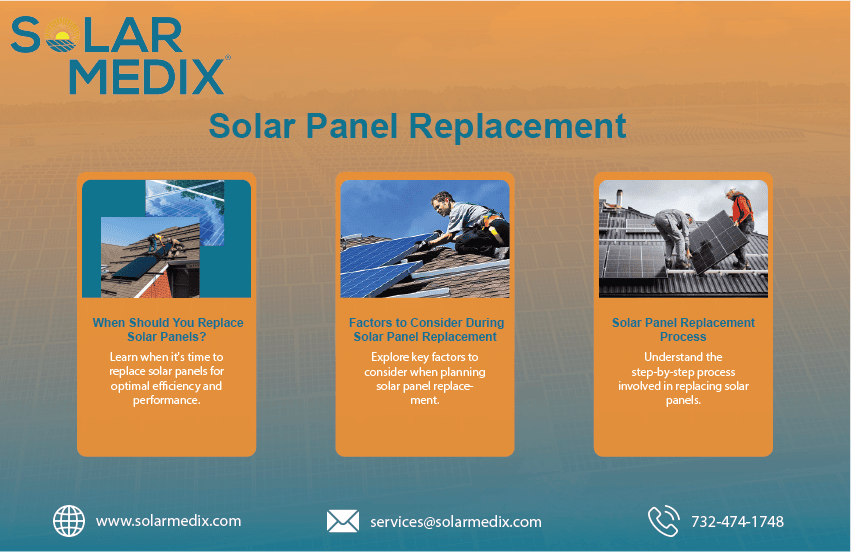
Replacing Solar Panels
While solar panels are incredibly robust and can withstand the test of time, they do not last forever. On average, most solar panels have a lifespan of around 25 to 30 years.
The solar panel lifespan can vary based on factors such as:
- The quality of the panels
- The climate they’re exposed to
- How well they’re maintained
Analyzing these influential metrics is important. Doing this helps you make an informed decision regarding your next steps. Your system’s future serviceability and productivity depend on your course of action! Getting your solar panels re-evaluated periodically is highly recommended. It helps postpone degradation risks and maximizes your ROI for sustained savings. Hire Solar Panel maintenance experts like Solar Medix today to get a complete evaluation of your solar system.
When Should You Replace Solar Panels?
Here are some common indicators to look out for:
- Lower Power Production: A common sign of solar panel aging is power output depletion. If your system is producing less electricity than it used to a few years ago, then there are chances that the panels have started to deteriorate.
- Physical Damage: Regularly inspect panels for physical damage. This includes cracks, chips, or corrosion (rusty spots in the case of steel panels). While performance degradation, physical damage may also create safety hazards.
- Fading or Discoloration: The panel surfaces are often seen fading or changing color over time. This may be due to exposure to the weather and deterioration.
- Visible Wear and Tear: If there’s visible damage to the top layers of the panels, then moisture can get in. It can even be a sign of further deterioration.
- Inverter Failure: An inverter changes the DC electricity from your panels into the AC electricity used by your appliances. If the inverter fails repeatedly, it could mean that the panels are failing to generate power.
- Technological Advancements: The world has seen significant advancements in solar panel technology. If your panels are outdated and more efficient options are available, it might be time for an upgrade.
Factors to Consider During Solar Panel Replacement
Replacing solar panels is a significant decision that requires careful consideration. The newer models promise increased output at lower expense; however, they do come with a hefty price tag. You must conduct a performance analysis along with the evolving landscape of alternatives. Doing this helps validate lasting value creation while aligning production with purpose.
- Panels’ Age: If your panels appear worn out and are near the end of their intended usage lifespan, replacement is highly recommended. Repairs may be costly and insufficient.
- Cost: Replacing older, less proficient panels with modern models can sometimes prove to be less expensive in the long run. Repeated maintenance and repair of aged units may not be worth the trouble.
- Energy Efficiency: You can create more current with fewer solar modules by using newer models. Modern systems boast higher efficiencies and optimized energy production.
- Warranty: Verify the stated warranty terms of your solar system. If still eligible under the stipulations of the guarantee, you may qualify for a FREE replacement or repair.
- Financial Incentives: When determining the best path, think about profit and loss. Check tax breaks, rebates, or incentives. Some solar providers grant great discounts to motivate you to convert to a more state-of-the-art solar system. With such offers, you can maximize your returns on investment.
The Replacement Process
Once your professional assessment is complete and a cost estimation in mind, you can proceed with having the damaged panel(s) replaced.
- Scheduling: Once your quote is confirmed, your solar installer will help you choose the best time for the replacement.
- Installation: The installers will come to your property to replace the existing solar panels with new ones.
- Time Required: The process of replacing generally takes 2-4 hours. The actual time, however, depends on the severity and complexity of your solar system.
- Final Testing: After the replacement, the installers will conduct thorough testing. They make sure the new panel is operating optimally within your solar system.
When you work with Solar Medix, you can expect a smooth and efficient replacement process. This is backed by our workmanship guarantee, ensuring peace of mind throughout.
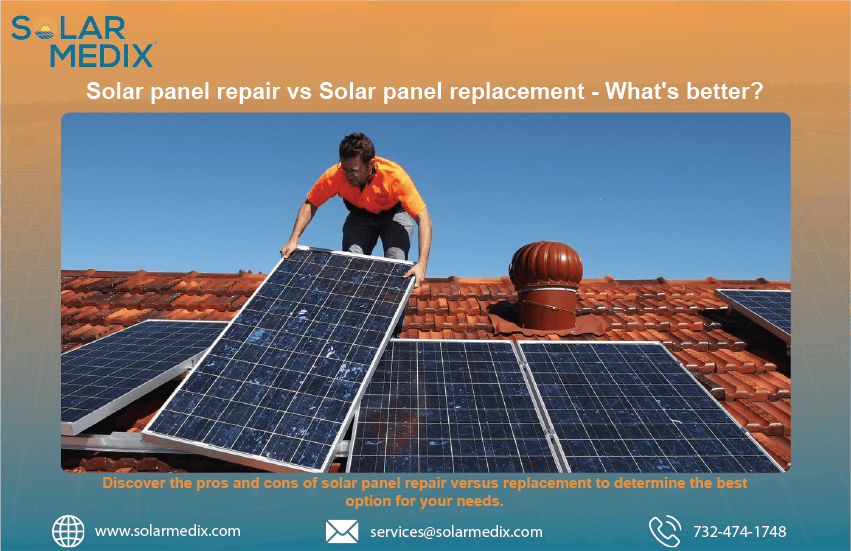
Solar Panel Repair vs Solar Panel Replacement – What’s Better?
The choice between repairing or replacing your solar panels should be a mix of the following:
- Technical assessments
- Financial factors
- Warranty standing
- Environmental ramifications
When you reach out to Solar Medix, we provide you with valuable information that helps you make an informed decision. Then, we devise a plan that fits within the framework of the valuation of data that you have and a framework of sustainability goals.
The experts at Solar Medix have decades of combined experience in the solar industry. With expertise in standard and state-of-the-art panel technologies, we’re ready to help.
Our technicians can detect many common solar panel failures right away, even before using their tools. With our reliable professionals, we provide good workmanship while offering honest expert advice.
So, call Solar Medix today and get consultation from our experts!
Frequently Asked Questions (FAQs)
Track your energy output. A sudden drop of 20% or more on sunny days suggests trouble. Visually inspect the panels for cracks, discoloration, or hot spots. If you see any of these signs, there may be an underlying issue requiring attention.
- Hail
- Wind
- Extreme temperatures
Annual inspections are recommended. Additional evaluations may be required after severe weather occurrences. This will help detect any minor damage before it worsens. More frequent inspections may be necessary if your panels seem to lose efficiency swiftly.
Repairs are typically cheaper for minor issues. However, consider a replacement if your panels are nearing the end of their lifespan or repairs become frequent.
Opt for companies with proven experience in the field. Check if they have proper qualifications, positive customer reviews, and strong warranties. Selecting the right solar company will provide you with years of peaceful bliss. So, make sure to do your research!













